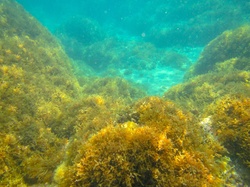In Case Undersea Cables Are Cut...
Undersea cables are a bit of an "elephant in the room..."
This isn't new technology and by now there are many such cables. There are also maps of these ("open-source intelligence"), however incomplete and inaccurate (or outdated intentionally, leaving out critical fallbacks). Publishing those maps is essential to prevent damage from ship anchors, among other physical threats, irrespective of the flag the ship bears. It's a case of collective responsibility at a global scale, albeit it relies on universal solidarity and respect for the world's communication facilities.
We all knew (all along) that reconnaissance by submarines had been done to map cables of "rival" blocs and we all knew that in case of war/s not only gas pipes and energy facilities would be targeted. Ask freezing Ukrainians this month what this means to them.
Between 2012 and 2022 I worked (indirectly) for a company that helped protect undersea cables and other 'deepwater' assets (the word "assets" gets thrown around a lot; it's almost always cables). We supported JBoss, PostgreSQL, GNU/Linux etc. for them. Tomorrow night marks exactly 2 years since I sent my letter of resignation and started focusing more on this site.
Recently, in our IRC network, we had a number of discussions about undersea cables and what it would mean if China (and its ally Russia) turned out to be systematically dragging anchors on the sea/ocean floor to vandalise key infrastructure. Almost all of the world's Internet traffic goes through undersea cables and almost all means of communication (even landlines) got offloaded to the Internet. The Baltic sea got the most attention for vandalism by Chinese vessels, with British waters being closely watched and guarded for movement of Russian vessels. They might be preparing a list of assets (intelligence) ahead of an actual attack, which can target many cables all at the same time. The way the Net was built, if one cable is cut (or even 10), an alternative routes for transmission of packets would get chosen, albeit speeds would decrease, as would latency (due to throughput limits and capacity issues). But each country has a finite number of "fat pipes" going in and out of it (consider what happened to Georgia when some metal digger hit a crucial cable over a decade ago) and satellites cannot cope with millions of simultaneous Net users, especially if they transmit large files or stream DRM garbage over Netflix.
I am neither an optimist nor a pessimist, probably just somewhere in the middle, but it seems likely that in the coming months or years we'll hear a lot more about severed undersea cables. For some countries this will mean either no connection or much slower connections (and sessions arbitrarily reset; this is fatal for some software). That means that sites which are low in complexity and bandwidth (such as ours) will become more accessible. Our Gemini capsule has very small footprint in terms of bandwidth. It's basically just the text of pages, nothing else. "Remember that Techrights and Tux Machines can still be accessed using Netscape 4," Ryan has just said in IRC. "It will look a bit wrong, but you can still read everything. The links to other sites won't work (SSL/TLS). The code to handle a basic web site was there over 25 years ago. A user-centric web with no copyright laws would be a dramatically different place. Browsers wouldn't have changed much since the 1990s. BitTorrent would be how things got moved around. People would have built exactly what they need and nothing more. The reason for total lack of security in the modern world is corporations coming and blowing it all sky high and starting over with overdesigned specifications meant to control what your computer is up to at all times. I was one of the first users of BitTorrent. Because I was one of the first users of every file sharing protocol, even back to Napster. The fake news media has re-defined what "digital native" means, and says that people who sit there all day looking at a phone are the first "digital natives". They act as if it wasn't the PC boom of the 90s and rampant "piracy" and hacker culture. They act like it only started when Apple gave it to the equivalent of the next wave Eternal September crowd, the iPhone user. As soon as iPhones got more and more widespread, I said to myself "Get these people off the goddamned Internet!" But it's a problem that's not going away. It brought in two things, I think. Boomers who took their property line disputes to "social media" and a bunch of barely educated children and young adults. And the noise drowned out everyone in between. Interestingly, CNN is behind a paywall now, mostly, because why not. But accessing CNN with 100 M/bit sec cable internet and no ad blocker on takes just as long as it did in 1998 over dial up. They used static pages back then. You signed in, there was a picture, you know, some text. Even in the early 2000s. The space shuttle broke up, here's what happened."
The demise of the Web is a subject we often revisit here in Techrights; back in the 90s people warned about how the Web would cause information loss (by 'replacing' physical archives that can last centuries) and how making sites too bloated would further exacerbate the matter.
But anyway, let's go back to basics. The Internet is a lot more precarious than people are led to assume. Their skinnerboxes would not operate without it.
Undersea cables are an issue and not a new issue. Monitoring undersea cables is nearly impossible at a scale that can detect/prevent sabotage because the cables are very long and are placed very deep (where only submarines or high-intensity sonar can see what's going on).
The issue has been somewhat of a taboo - mostly overlooked or entirely ignored at times of peace. This is likely to change. █

